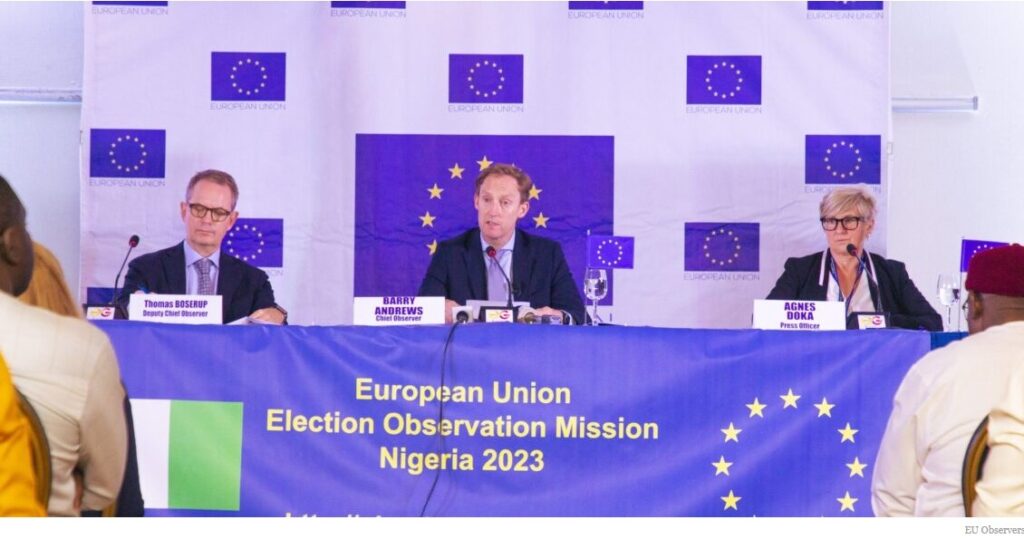The European Union (EU) has called on the Nigerian government to give adequate protection to freedom of expression by developing a comprehensive operational framework underpinned by the skills and means for ensuring prompt investigation and prosecution of all types of attacks against media practitioners.
This and other recommendations are contained in the final report on the media coverage of the February 25 and March 18, 2023, general elections in Nigeria, released by the European Union Election Observation Mission (EU EOM).
The report highlights various constraints faced by the media, including economic hardship, institutional pressures, and electoral violence. It also raises concerns about attacks on journalists that went unpunished, hindering freedom of expression and media plurality.
Emphasising the significance of the media in providing extensive coverage of the elections, promoting voter information campaigns, and engaging in fact-checking, it notes that long-standing systemic issues curtailed media freedom and diversity, limiting analytical reporting and scrutiny of candidates. This lack of comprehensive reporting hindered voters’ ability to make well-informed choices.
The EU EOM report highlights the failure of law enforcement agencies to prosecute individuals who attacked, intimidated, harassed, or obstructed journalists, noting that physical assaults against media practitioners, along with online harassment, occurred without consequences, thereby undermining freedom of expression. The report records several incidents where police detained journalists who documented irregularities but did not apprehend the attackers. This impunity, it points out, discourages independent and trusted outlets and is inconsistent with Nigeria’s regional and international commitments to protect the media and freedom of expression.
The report noted that radio stations play a crucial role in shaping electoral choices in rural areas, while television, online, and print outlets are vital for reaching the urban electorate. It reveals that the media environment at the federal level offers some diversity of views due to commercial competition. It noted however, that at the state level, media outlets face cumbersome license conditions, high fees, security concerns, and politicised allocation of frequencies, leading to a subservient media environment controlled by the incumbent. This lack of diversity, it says, is particularly pronounced in the Northern states, requiring immediate actions to ensure compliance with regional and international standards for media pluralism.
Regarding the legal and regulatory framework, the report states that Nigeria’s constitution does not effectively uphold the guaranteed freedom of expression and freedom of the press. It states that selective application of laws, such as the Penal Code, Cybercrimes Act, and Official Secrets Act, have been used to silence dissent in traditional media and online platforms, and that journalists critical of politically sensitive topics have been arrested for vaguely defined offenses, contradicting regional and international standards for freedom of expression.
The report also highlights the importance of the Freedom of Information (FOI) Act, which regulates access to information held by public institutions. It notes that the implementation of the FOI Act lacks robustness and efficiency, with difficulties and denials faced by journalists seeking information of public interest. It adds that the lack of transparency in many state institutions also contributes to the spread of disinformation.
The report notes that while the Nigerian Broadcasting Code and the Electoral Act, 2022 which govern media coverage of elections provide a basis for a level playing field, vague definitions allow for arbitrary enforcement, negatively impacting critical outlets. It also noted that the National Broadcasting Commission (NBC), responsible for overseeing broadcast media compliance, lacks independence, transparency, and stakeholders’ trust. It criticized the NBC for disproportionate penalties imposed on broadcasters and its lack of transparency in decision-making processes.
The report also recommends safeguarding freedom of expression and transparency by ensuring the independence of the NBC in both law and practice, adding that this can be achieved through an inclusive pre-selection process for NBC management, transparency requirements, and accountability measures.
It highlights the influence of governors and state-level agencies in exerting pressure on media owners and interfering with their work, stressing that state-level self-censorship reduces the diversity of information available to voters and allows governors to control the information environment in their respective states.
The report calls for the transformation of federal government-owned media, such as the Nigerian Television Authority (NTA) and the Federal Radio Corporation of Nigeria (FRCN), into genuine public service broadcasters. This transformation, it adds, should include provisions for editorial independence, financial autonomy, clear separation from the government, and an open and competitive pre-selection process for management.
In terms of media monitoring, the report acknowledges the media’s efforts in informing voters on key issues and providing transparency in the electoral process. However, it criticizes the dominance of negative rhetoric and the lack of issue-based debates. It also highlights the failure of the Independent National Electoral Commission (INEC) and some election officials to respond to media interview requests, disregarding voters’ right to access election-related information.
Regarding social media and digital rights, the report highlights the importance of these platforms for information exchange, campaigning, and mobilization. However, it also acknowledges the challenges of false information, harassment, and intimidation. The report calls for the amendment of restrictive legislative provisions, such as the vague definitions of “cyberstalking” in the Cybercrimes Act and “classified matters” in the Official Secrets Act, to align with international and regional standards on freedom of expression.
Raising concerns about attempts by authorities to regulate online spaces and social media platforms, it emphasizes the need for inclusive processes involving key stakeholders to develop legislative or regulatory measures that protect freedom of expression while curbing harmful content. It also calls for robust data protection mechanisms, given the use of biometric data in the electoral process.






